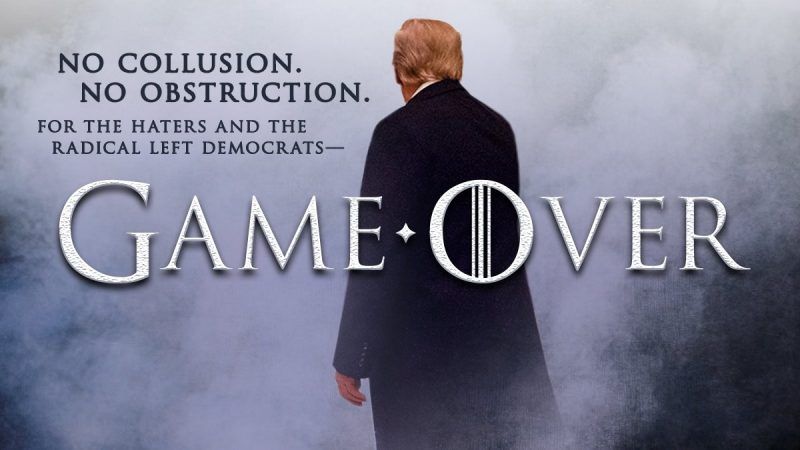In Defense of Trump Obstructing Justice (When There's No Underlying Crime)
Forget about Donald Trump and the Mueller report and think about all the little (and not-so-little) people who get crushed by the feds.

I haven't read the Mueller report and I don't plan to any time soon. I don't feel like I would gain much by sifting through what's already been widely acknowledged to be 400-plus pages of Rorschach test. The main point of the "Russia probe" was to figure out whether there was any sort of hanky-panky going on between the former (future?) Soviets and the Trump campaign, and we now know that there was not.
But of course now the story shifts from dark worries about "collusion" to unrestrained outrage over the president's ham-fisted attempts to "obstruct justice" by unduly influencing the investigation by lying in public and private, firing key players, leaning on witnesses, or otherwise gumming up the works. I trust my Reason colleagues (Scott Shackford, Peter Suderman, Jacob Sullum, and Eric Boehm), each of whom argues to varying degrees that if President Donald Trump isn't technically guilty of obstruction, it's not for lack of trying. It's mostly because his subordinates either refused to follow his orders or screwed things up while trying to do his bidding.
But you know what? I don't care that much that Trump was trying to obstruct justice in this instance. Certainly, if there is no underlying crime, you shouldn't get in trouble for lying to the feds, even though it's technically illegal. Section 1001 of Title 18 of the United States Code makes it a crime to
"knowingly and willfully … make[] any materially false, fictitious, or fraudulent statement or representation" in the course of "any matter within the jurisdiction of the executive, legislative, or judicial branch" of the federal government.
But should it be? We'll come back to the White House in a moment, but the way this sort of usually plays out for the little people is that, as Jim Talent observed last year in National Review,
The FBI gathers information about a person, finds facts that the person might want to conceal — not because the facts prove a crime but because they are embarrassing for some other reason — then asks about those facts in an interview, on the expectation that the person will lie and thereby incriminate himself.
As Popehat blogger (and Reason contributor) Ken White has detailed extensively, FBI agents are trained to get you to lie, thereby being able to arrest you or squeeze you however they want. As White wrote for Reason a year ago,
In the old westerns, rather than take the trouble of hauling mustachioed miscreants to desultory trials, lawmen would often provoke them into drawing first, thus justifying shooting them down where they stood. A modern federal interview of a subject or target is like that. One purpose, arguably the primary purpose, is to provoke the foolish interviewee into lying, thus committing a new, fresh federal crime that is easily prosecuted, rendering the original investigation irrelevant. Title 18, United States Code, Section 1001, which makes it a felony to lie to the feds, is their shiny quick-draw sidearm. This result not an exception; it is the rule. It happens again and again.
Consider George Papadopoulos. The special counsel secured his guilty plea not for improper contact with the Russians but for lying about that contact to the FBI. Consider Michael Flynn. He too pled guilty not to unlawful contact with Russians but to lying to the FBI about that contact. Consider Scooter Libby, or Martha Stewart, or Dennis Hastert, or James Cartwright, all taken down by the feds not for their alleged original misconduct but for lying about it. Even when catching someone in a lie isn't enough to force them to plead guilty, it can add charges to a case. Consider Paul Manafort and Richard Gates, charged not just with substantive crimes but with lying to the FBI about them.
There is arguably no person on the planet less sympathetic than Donald Trump. He is a reflexive liar, a blowhard, a bully, and the goddamned president of the United States. He should be a better person on all fronts and there's no doubt that he should set a better example than he does. But when it comes to obstructing justice, at least when there was no underlying crime, he shouldn't be in any trouble whatsoever.
Far more important, the rest of us shouldn't be when we get set up to lie by the FBI or other law enforcement folks who have a tremendous amount of power. At The New York Times, David Brooks suggests that one of the great messages of the Mueller investigation is that it reveals
Trump doesn't seem to have any notion of loyalty to an office. All power in his eye is personal power, and the government is there to serve his Sun God self. He'll continue to trample the proper systems of government.
There's much truth to that formulation, which has been echoed by many of the president's critics. But there's a bigger takeaway worth underscoring, one that is vastly more important than Donald Trump who, truth be told, is acting how most presidents have acted in the past and will act in the future.
The bigger takeaway is that the federal government exercises vast and nearly unchecked power over virtually every aspect of our lives. As civil libertarian and Three Felonies a Day author Harvey Silverglate has told Reason, there are literally hundreds of thousands of federal regulations under "each of the federal criminal statutes … [and] you're just assumed to know [them] and you can be picked up and you can be charged and these are real criminal violations." And if that doesn't work, the feds can snag you simply by talking to you. Contempt for Donald Trump shouldn't obscure that brutal reality, which will outlive the Mueller report and probably most of us, too.


Show Comments (219)